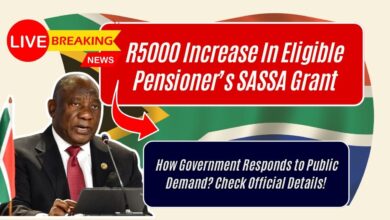Could You Qualify for the New £140 Weekly DWP Benefit? Check Eligibility Criteria!
Could You Qualify for the New £140 Weekly DWP Benefit – If you’ve been hearing buzz around the new £140 weekly benefit from the UK’s Department for Work and Pensions (DWP), you’re not alone. This benefit is making waves as a potential game-changer for folks under state pension age who are dealing with disabilities or health conditions that limit their ability to work. But here’s the kicker — it’s not just about the cash. Even if you don’t get the weekly payments, you could still score National Insurance (NI) credits, which are crucial for building up your state pension later on.

So, could you qualify for this new £140 weekly DWP benefit? Let’s break it down, get into the nitty-gritty of the eligibility criteria, explain how to apply, and why this benefit matters — whether you’re cash-strapped now or thinking ahead to retirement.
Could You Qualify for the New £140 Weekly DWP Benefit
| Feature | Details |
|---|---|
| Benefit Amount | Up to £140.55 per week |
| Eligibility Age | Under state pension age (currently under 66) |
| Primary Qualification | Disability or health condition limiting work ability |
| National Insurance Credits | Available even if no cash benefit is received |
| Application Window | Ideally 3 months before Statutory Sick Pay ends |
| Private Pension Impact | Private pensions over £85/week reduce ESA payments |
| Official Application Link | gov.uk/employment-support-allowance/how-to-claim |
The new £140 weekly DWP benefit is more than just a paycheck—it’s a safety net and a stepping stone to securing your future. Whether you’re struggling to get by today or planning for tomorrow’s retirement, understanding how to qualify and apply is crucial.
Don’t sleep on this opportunity. Even if the weekly payment isn’t in the cards, those National Insurance credits can add up big time when it’s time to retire. The earlier you apply, the better your chances of keeping your finances steady and your pension intact.
What’s This New £140 Weekly DWP Benefit All About?
Alright, picture this: you’re under the state pension age and dealing with a health condition or disability that’s making it tough to work. The DWP’s new-style Employment Support Allowance (ESA) is designed just for you. It’s a weekly payment of up to £140.55, depending on your specific situation.
But here’s where it gets interesting: even if your financial situation means you don’t qualify for the cash payment, applying can still snag you National Insurance credits. These credits are like little building blocks for your state pension. Missing out on them now could mean a smaller pension check down the road.
Who Exactly Qualifies? Let’s Get Into the Eligibility Criteria
This benefit isn’t a free-for-all; it’s targeted to help those who genuinely need it. Here’s the lowdown on who’s likely to qualify:
1. You Must Be Under the State Pension Age
As of now, the UK state pension age is 66 (though it’s set to increase gradually). If you’re under 66, you’re in the running. Once you hit pension age, this benefit no longer applies.
2. You Have a Health Condition or Disability Limiting Work
The core of this benefit is supporting those who are limited in their ability to work due to health or disability reasons. Whether it’s a physical ailment or a mental health challenge, if your condition significantly restricts your capacity to work, you could qualify.
3. You’ve Paid Enough National Insurance Contributions
To get this benefit (or at least the NI credits), you must have paid sufficient National Insurance contributions, typically in the last 2-3 years before claiming. This means you’ve been working and contributing, or otherwise eligible for NI credits.
4. Your Employment Status
You need to be currently unable to work or have a limited capability to work. The benefit isn’t designed for folks who are fully able to work or earning above certain thresholds.
How Does Private Pension Income Affect Your Benefit?
Got a private pension? Heads up — it could reduce the amount you get from this benefit.
Here’s how it works:
- If your private pension pays you more than £85 per week, your ESA payments will be reduced.
- Specifically, half of the amount over £85 will be deducted.
For example:
If you get £100 per week from a private pension, that’s £15 over £85. Half of £15 is £7.50, so your ESA gets reduced by £7.50.
Why National Insurance Credits Matter — Even If You Don’t Get Cash Payments?
One of the smartest moves you can make is to apply even if you don’t think you’ll qualify for the cash benefit. Why? Because the DWP may still award you National Insurance credits.
NI credits are vital because:
- They fill gaps in your NI record.
- Help you qualify for the full state pension when you retire.
- Even missing a single year of contributions can reduce your pension.
According to the UK government, one missing year can cut your state pension by up to 9%. That’s a serious dent.
Real-Life Example: Meet Sarah
Sarah, 45, was diagnosed with a chronic condition that limits her mobility. She can’t work full-time but does some freelance work occasionally. She applied for the new-style ESA, and though her freelance income was low, it impacted her ESA payment. Still, by applying, she secured NI credits that keep her pension record solid. Now, she’s not only getting some financial support weekly but also safeguarding her future pension. Stories like Sarah’s highlight how this benefit can be a lifeline.
Common Pitfalls to Avoid When Applying
Many applicants stumble over:
- Applying too late: Waiting until Statutory Sick Pay runs out can cause income gaps.
- Incomplete documentation: Missing medical evidence or NI contribution info delays claims.
- Ignoring NI credits: Some skip applying if they don’t expect cash, missing crucial pension credits.
- Not checking impact of other pensions or benefits: Overlooking how private pensions affect ESA leads to surprises.
Avoid these by preparing early, gathering all paperwork, and consulting official resources or advisors.
How to Apply for the New-Style Employment Support Allowance (ESA)?
Ready to get the ball rolling? Here’s how to apply:
Step 1: Gather Your Documents
- Personal identification (passport, driver’s license)
- National Insurance number
- Details about your health condition or disability
- Evidence of your National Insurance contributions if available
Step 2: Apply Online
The easiest way is to head over to the official UK government website:
https://www.gov.uk/employment-support-allowance/how-to-claim
Step 3: Or Apply by Phone
If online isn’t your jam, call the Jobcentre Plus new claims line at: 0800 055 6688
Step 4: Apply Early
It’s best to apply up to three months before your Statutory Sick Pay (SSP) ends to avoid gaps in your income.
How This Benefit Fits Into Your Career and Financial Planning?
If you’re dealing with health issues that affect your work, this benefit isn’t just a temporary patch. It’s a crucial part of your financial strategy.
- Income Stability: Keeps money flowing while you manage your health.
- Protects Your Pension: NI credits mean your long-term retirement security isn’t compromised.
- Career Flexibility: Offers some breathing room to focus on recovery or training for new roles.
- Supports Transition: For those moving towards disability benefits or adjusted work patterns.
How Does ESA Compare to Other Benefits Like Universal Credit or PIP?
While ESA targets your ability to work, Universal Credit (UC) is broader, covering a range of income and work scenarios. Personal Independence Payment (PIP) focuses more on the extra costs of disability.
In many cases:
- You might get NI credits automatically through UC if disabled.
- ESA often has stricter health assessments.
- Combining ESA with other benefits can maximize support, but rules vary.
Always check with official tools or benefits advisors to understand your best options.
Tips for a Successful Application
- Start early: Don’t wait until your SSP ends.
- Get medical evidence: GP letters, hospital reports, and assessments help.
- Keep records: Document all correspondence and appointments.
- Seek support: Use charities, advice groups (like Citizens Advice), or legal aid if needed.
- Understand assessments: Prepare for Work Capability Assessments honestly and thoroughly.
Latest Stats and Trends
As of the latest data from the DWP, over 1.5 million people claim ESA or similar benefits, with increasing numbers due to chronic health issues and aging workforce trends. The government continues adjusting thresholds and assessments, so staying updated is key.
Where to Get Help and Advice?
- Citizens Advice: www.citizensadvice.org.uk
- Disability Rights UK: www.disabilityrightsuk.org
- DWP Official Site: gov.uk/employment-support-allowance
- Jobcentre Plus: Local offices can assist with claims and assessments.
DWP Benefits Update: Check Your Payments Details After Recent Date Change
DWP Alert: Check the 3 Text Messages Benefit Claimants Should Avoid Sending!v
DWP Announces Benefit Hike for Pensioners Born After 1951 — Find Out If You Qualify
FAQs About Could You Qualify for the New £140 Weekly DWP Benefit
Q1: Can I get this benefit if I’m over state pension age?
No. This benefit is only for those under the current state pension age.
Q2: What if I’m already receiving Universal Credit?
You may automatically qualify for NI credits if you have a health condition or disability. Make sure to check your claim status.
Q3: Does this benefit affect other benefits I receive?
ESA can impact other benefits, so always check with a benefits advisor or official resources to understand how it fits into your overall benefits package.
Q4: What if I have gaps in my National Insurance record?
Applying for this benefit can help fill those gaps through NI credits, improving your future pension.
Q5: Is there a limit on how much I can earn while claiming this benefit?
Yes, there are income limits, and your eligibility might be affected if you earn above those thresholds.







